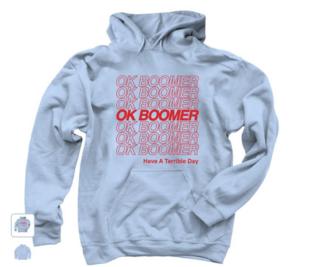
Image copyright
Shannon O’Connor
Shannon O’Connor has made $25,000 out of a two-word slogan.
All the 18-year-old US art student did was design a T-shirt bearing the phrase: “OK Boomer”.
Then she added the kicker: “Have A Terrible Day”.
She has to date sold more than 2,000 of the T-shirts and sweatshirts to youngsters keen to deliver a collective eye-roll at the older folk all around them.
She isn’t the only one. The phrase has been gathering momentum for some months on the other side of the Atlantic.
Image copyright
@lesnianrights
And entrepreneurially minded youngsters are selling designs that can be printed on stickers, badges, blankets and phone cases as well as clothing.
“‘OK Boomer’ is a meme. It picked up on Tik Tok,” Shannon told BBC Radio 5 Live. In other words, it’s a catchphrase that appears a lot on an online video-sharing platform that no-one over 25 uses much.
“It is essentially Gen Z trying to fight back at the baby boomers of the world, who try to put us down a lot and criticise us,” she explained. “We’ve found our voice and we’re expressing it.”
Why listen?
Generation Z – loosely, anyone born after about 1995 or even later – is feeling touchy, which is one of the things baby boomers find fault with.
They think they’re labelled as over-sensitive, glued to their phones and maybe a little bit indulged. They resent criticism – and being dubbed “snowflakes” – by an older generation they view as having had an easier time.
They blame their grandparents for trashing the environment and voting for a president who refuses to do anything about it. But they don’t limit the use of the term “boomer” to the post-war generation it usually refers to.
It can be applied to anyone older than around 25, who displays judgemental, conservative or narrow-minded attitudes.
And “OK Boomer” is their way of saying: why would I listen to you?
Image copyright
Winbite
“It’s a comeback to say, ‘We’re going to prove you wrong and do great things despite what you might think of us,'” said Shannon.
“We have a lot of understanding of political and social issues in a different light to the boomers,” she added. “Times have changed a lot.”
In a way, it isn’t a million miles from wearing a Che Guevara T-shirt.
Even if the phrase hasn’t caught on widely over this side of the pond yet, it could resonate with British youngsters who know their parents had free university education, steadier job prospects and lower housing costs.
There is some debate cropping up online over whether growing up with corporal punishment, conscription, the threat of nuclear war and laws against homosexuality means boomers’ youths really were so much better. But it’s not clear if Gen Z is listening.
Source link

